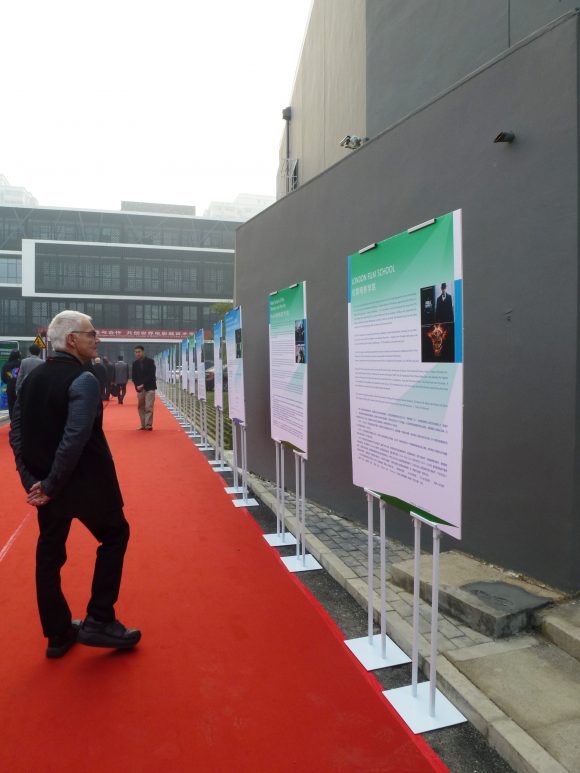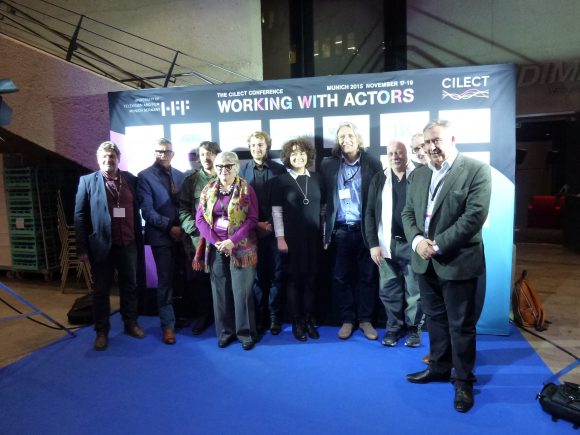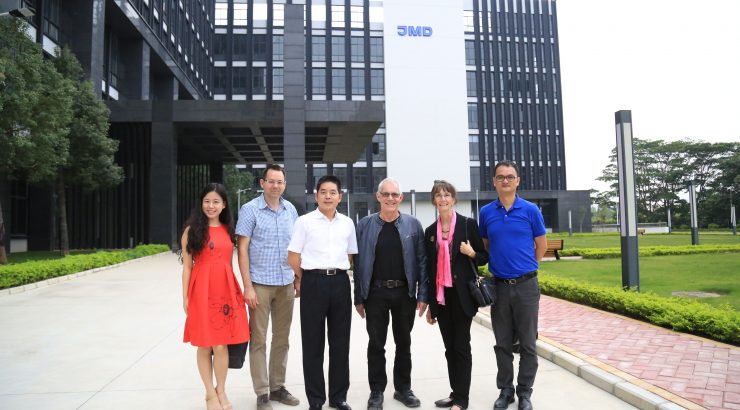On The World Stage
June 9, 2016
In Beijing
On the world stage, film schools can play an important and provocative role—by preparing young artists to tell their stories through the most powerful medium of our time. In so doing, film schools enable the next generation to challenge the status quo, to support a diversity of viewpoints, and to engage in and shape their national and cultural identities.
These and other key questions about the value of an arts education were addressed by deans and professors from 31 film schools in 19 countries around the world invited to celebrate the 110
th
anniversary of filmmaking in China and the 65
th
anniversary of the Beijing Film Academy (BFA) at the World Film Institutions Forum in Beijing in October.
In 29 speeches over the course of two days, administrators and faculty addressed the future and structure of film education.
The role of cinema in creating national identity was a theme for Garth Holmes, executive chairman of the South African School of Motion Picture Medium and Live Performance, who cited the particular challenges of South African society and the importance of film in creating a new cultural identity, one that takes “all South African culture into consideration.”
The importance of enabling stories told by differing voices was frequently reiterated. Film students, various speakers said, are “the authors of future culture.” The strength of that culture, said Kwang-Wu Kim, president and CEO of Columbia College, Chicago, is tied to the plurality of voices represented and the interaction students have with those of other cultural, racial and socio-economic backgrounds, as well as with other definitions and forms of creative practice.

International co-productions, for example, said Kim Dong-Ho, dean of the Graduate School of Cinematic Content at Dankook University, Korea, “will make my cinema and your cinema more interesting.”
The power and importance of film as an art form was also a recurring theme. “Artists are the engineers of the human spirit,” said Dong Wei, vice minister of the Ministry of Culture of the People’s Republic of China, who opened the proceedings. This sentiment was echoed by Vladimir Malyshev, rector of the Russian State University of Cinematography, representing the world’s first film school, founded in 1919. “Film art is the gateway to the spiritual world,” he said.
Chapman University film school dean Bob Bassett challenged film educators to fundamentally rethink the structure of their curricula.
The traditional model of film school education, based on director-driven projects, does not serve students because it does not reflect how films are typically made in the business today, Dean Bassett said. He challenged educators to put student producers in charge of developing projects and creative teams, including finding material and selecting a director. The result, he said, will be stronger teams and graduates better prepared to work in the industry where producers not only find financing but also function in a truly creative role.
In Shenzhen
While in China, Dean Bassett also explored potential partnerships and exchanges with BFA and film schools in other countries to build on Chapman’s ongoing international programs offering filmmaking experiences abroad. He led a delegation to the southeastern city of Shenzhen, the first and most successful of China’s special economic zones, located just across the border from Hong Kong.
Sometimes referred to as China’s Silicon Valley, Shenzhen has enjoyed rapid growth and modernization and is a major financial center in China. Dodge College representatives toured the 800,000-square-foot film hub built to house a film training program by Artention Films Company.
Discussions are currently underway with Kim Zheng of Artention to create a curriculum and launch an 8-week certificate program this summer to train film students in Shenzhen.
In Munich
“Working with Actors” was the theme of the 2015 conference of the International Association of Film and Television Schools (CILECT), at the University of Television and Film in Munich, Germany in November. Dodge College Dean Bob Bassett, Associate Dean Michael Kowalski, Division Chairs Eric Young and Janell Shearer, and Professor Roy Finch joined faculty from around the world to explore teaching students how to work with actors.
As summarized by Stanislav Semerdjiev, executive director of CILECT and a professor at the National Academy for Theater and Film Arts in Bulgaria, the goal of many of the panels and workshops was to explore how “to direct for the actors, not direct the actors.” That fine distinction played out in demonstrations that explored various methods of helping both directors and actors explore character as well as addressing the role of casting, auditions, improv and the language used by directors to help discover and shape a character and a performance.

Additional sessions addressed helping actors understand the role of editing in creating performance, the differences between scene objectives and character objectives, the use of voiceover in telling a story, and the impact of visual effects and computer-generated characters on audience perceptions of performance.
“The wide range of presentations and demonstrations we saw in Munich provoked a lot of thought and discussion about how we teach acting,” says Dean Bassett. “I am hopeful that we will be able to bring some of these workshops to Chapman in the future, to help our students explore the very latest techniques as acting continues to be impacted as much as technology as by the learning curve of young directors.”
In Beruit and Taipei
Associate Dean and sound Professor Michael Kowalski visited both the Lebanese Academy of Fine Arts in Beruit and Taipei National University of the Arts in Taiwan to conduct workshops on post-audio and review their sound curricula.
From Prague
Pavel Jech, Dean of Film and TV School of the Academy of Performing Arts (FAMU), in the Czech Republic, one of the world’s oldest and most prestigious film schools, came to Chapman in February to talk about the differences between European and American short films and to share his teaching methodology. He also conducted workshops for advanced screenwriting and directing students.


